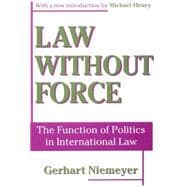
Note: Supplemental materials are not guaranteed with Rental or Used book purchases.
Purchase Benefits
What is included with this book?
| Introduction to the Transaction Edition | xi | ||||
| Preface | xxv | ||||
| Acknowledgments | xxvii | ||||
| Introduction: The Unreality of International Law and the Unlawfulness of International Reality | 1 | (2) | |||
|
3 | (1) | |||
|
4 | (4) | |||
|
8 | (6) | |||
|
14 | (2) | |||
|
16 | (3) | |||
|
19 | (8) | |||
| PART ONE THE FUNCTION OF LAW IN INTERNATIONAL POLITICS | |||||
|
27 | (1) | |||
|
27 | (3) | |||
|
30 | (4) | |||
|
34 | (3) | |||
|
37 | (3) | |||
|
40 | (2) | |||
|
42 | (16) | |||
|
42 | (3) | |||
|
45 | (2) | |||
|
47 | (4) | |||
|
51 | (7) | |||
|
58 | (18) | |||
|
58 | (6) | |||
|
64 | (4) | |||
|
68 | (3) | |||
|
71 | (5) | |||
|
76 | (58) | |||
|
76 | (2) | |||
|
78 | (5) | |||
|
83 | (4) | |||
|
87 | (2) | |||
|
89 | (3) | |||
|
92 | (5) | |||
|
97 | (1) | |||
|
98 | (7) | |||
| PART TWO LEGAL THEORY AND POLITICAL REALITY | |||||
|
105 | (1) | |||
|
105 | (3) | |||
|
108 | (3) | |||
|
111 | (2) | |||
|
113 | (3) | |||
|
116 | (3) | |||
|
119 | (6) | |||
|
125 | (3) | |||
|
128 | (5) | |||
|
133 | (1) | |||
|
134 | (39) | |||
|
134 | (2) | |||
|
136 | (3) | |||
|
139 | (3) | |||
|
142 | (6) | |||
|
148 | (7) | |||
|
155 | (3) | |||
|
158 | (9) | |||
|
167 | (4) | |||
|
171 | (2) | |||
|
173 | (34) | |||
|
173 | (1) | |||
|
174 | (3) | |||
|
177 | (7) | |||
|
184 | (6) | |||
|
190 | (3) | |||
|
193 | (7) | |||
|
200 | (7) | |||
|
207 | (81) | |||
|
207 | (2) | |||
|
209 | (6) | |||
|
215 | (5) | |||
|
220 | (6) | |||
|
226 | (3) | |||
|
229 | (4) | |||
|
233 | (8) | |||
| PART THREE A RECONSTRUCTION OF INTERNATIONAL LAW | |||||
|
241 | (1) | |||
|
241 | (3) | |||
|
244 | (5) | |||
|
249 | (7) | |||
|
256 | (9) | |||
|
265 | (6) | |||
|
271 | (6) | |||
|
277 | (3) | |||
|
280 | (5) | |||
|
285 | (1) | |||
|
286 | (2) | |||
|
288 | (38) | |||
|
289 | (4) | |||
|
293 | (6) | |||
|
299 | (5) | |||
|
304 | (4) | |||
|
308 | (5) | |||
|
313 | (2) | |||
|
315 | (3) | |||
|
318 | (5) | |||
|
323 | (3) | |||
|
326 | (53) | |||
|
326 | (6) | |||
|
332 | (4) | |||
|
336 | (4) | |||
|
340 | (2) | |||
|
342 | (3) | |||
|
345 | (4) | |||
|
349 | (7) | |||
|
356 | (3) | |||
|
359 | (2) | |||
|
361 | (2) | |||
|
363 | (8) | |||
|
371 | (3) | |||
|
374 | (5) | |||
|
379 | (24) | |||
|
379 | (3) | |||
|
382 | (4) | |||
|
386 | (2) | |||
|
388 | (5) | |||
|
393 | (4) | |||
|
397 | (3) | |||
|
400 | (3) | |||
| Index | 403 |
The New copy of this book will include any supplemental materials advertised. Please check the title of the book to determine if it should include any access cards, study guides, lab manuals, CDs, etc.
The Used, Rental and eBook copies of this book are not guaranteed to include any supplemental materials. Typically, only the book itself is included. This is true even if the title states it includes any access cards, study guides, lab manuals, CDs, etc.